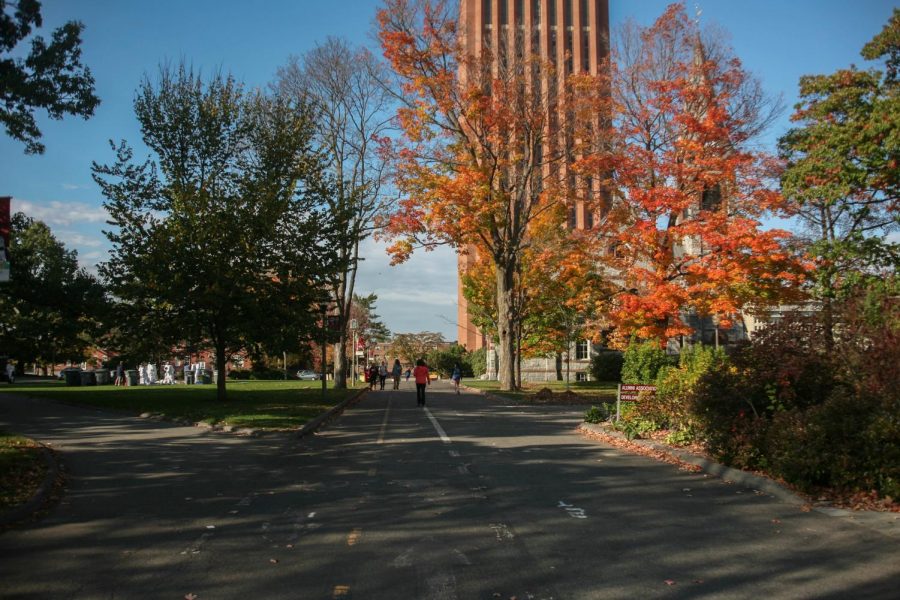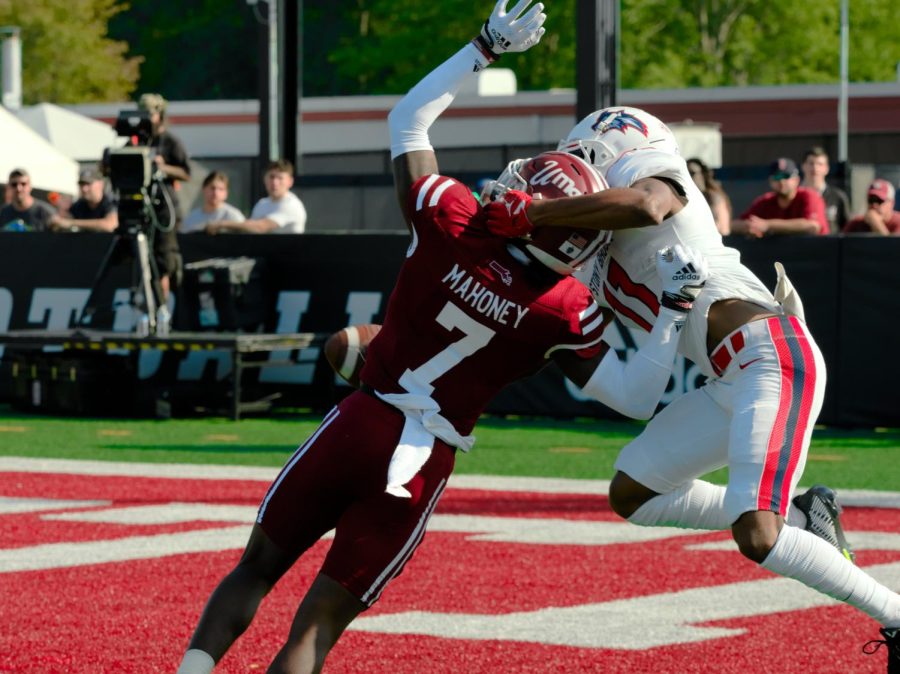Disability Services and the Assistive Technology Center at the University of Massachusetts have been working to assist registered students in their transition to remote learning following the onset of the COVID-19 pandemic.
Disability Services is currently continuing to hold all of its scheduled appointments by phone calls or over Zoom. The office is also in regular communication with registered students, and the website is updated daily with resources.
One of the initial challenges was providing office employees with remote access to Disability Services’ confidential database. However, with help from the ATC, the employees are all “pretty well situated at this point,” according to Disability Services Interim Director AnnMarie P. Duchon. Although office employees no longer have access to office fax machines, the registration process has been adjusted so students are now able to register by submitting their diagnostic information through an online intake form on the Disability Services website.
Duchon says the most profound impact has been on the adjustment to exam proctoring. Since students are not on campus to receive their exam accommodations, such as extended time and a distraction-reduced environment, through the Disability Services Exam Proctoring Center, Disability Services has been providing additional instruction to faculty members on how to provide those accommodations themselves, remotely.
“The extended time is largely what the faculty can help with by extending deadlines,” said Duchon. “But the distraction-reduced piece I think is one of those things that’s going to depend on the person’s home environment and I think that that’s another reason why we’re trying to seek just a little bit more goodwill with folks, knowing that we only have so much control over our environments.”
Students registered with Disability Services have continued to meet with their learning specialists over Zoom, as well, to continue receiving academic support. Apps such as Trello have also provided an online, shareable platform on which students and their learning specialists can collaborate to create schedules and time management tools.
Rachel Adams, assistant director of Academic Access within Disability Services, oversees the learning specialist program. Although students have started to adapt to an online format, she worries that distance learning “takes away from some of the personal connections that they’ve shown and established” with their learning specialists.
“I think some students are feeling really disheartened by the situation,” said Adams. “And their motivation might drop as a result of it, or their executive functioning, because their environments are completely different and routines are thrown off.”
Some students have expressed positive reactions to the transition, as recorded lectures and online materials have allowed for students to learn at their own paces and have all of their assignments readily available online.
One of Duchon’s and Adams’ main concerns with the transition to remote learning is how students will be affected socially. Those finding themselves in need of mental health support are encouraged to contact the UMass Center for Counseling and Psychological Health.
“I think we are particularly concerned about folks who are in unsavory environments,” said Duchon. “Not everyone has a safe, comfortable, warm home. Not everyone has a great relationship with their family. Everyone in the world is anxious right now, so for folks who are dealing with psychological disabilities or already have anxiety, it’s important to note that the CCPH continues to meet with their students, and they have lots of resources there that they’ll be pushing out to everyone who is remote now.”
“I think for a lot of folks, education is very much about the social connections,” said Adams. “We’re here at the University to learn, but we don’t learn in a vacuum. We learn with other people, and having that social connection removed for some folks is very challenging.”
Duchon and Adams also urge students to reach out Disability Services during this transition, as they understand it can be a stressful and difficult time.
“Be patient with yourself,” said Duchon. “I think we’re all in uncharted water, so take the options that are available to you to take care, to connect with your friends and peers remotely, but also just know that nobody’s knocking it out of the park right now. This is temporary, and I think we’ll learn a ton of lessons from it.”
“I know that this is scary,” said Adams. “And I know that this is hard. But it’s temporary, and there’s help, and you don’t have to go through it alone. We’re going to get through this.”
Josh Pearson, the assistive technology specialist at the ATC, helps train students, staff and faculty across different departments to access a variety of technologies and software, researches emerging technologies and ensures that assistive technology and accessibility are a part of UMass curricula.
Pearson has been meeting with UMass community members in need of technological assistance virtually over Zoom, Google Meet and Microsoft Teams.
“I assess their needs, so I’m figuring out what they are trying to do, what are the tasks that they’re trying to complete and then what is the tool that’s best going to be able to help them,” said Pearson. “What I’m trying to do is make sure that everybody who needs access to this technology has access to it.”
One of Pearson’s priorities has been ensuring that the faculty’s course standards are in line with the needs of those who require accessibility assistance. For instance, scanning readings properly so that students using screen reading technology are not required to do the extra step of converting them for video conference meetings.
Pearson is also concerned with the potential inaccessibility of the proper technology required for learning that would otherwise be available on campus.
“It’s an equity issue around access to technology, and this is whether you are a person with a disability or not,” said Pearson. “People are being asked to go into this remote learning thing without proper access to the internet. They might not have access to all the devices that they have access to on campus.”
Devices such as iPads, accessibility-related apps, adaptive mice, adaptive keyboards, eye gaze devices and other software and assistive technologies are located on the UMass campus in a lab at the W.E.B. Du Bois Library and are available for assistive learning. The Assistive Technology Center also provides access to screen readers, magnification software, dictation software, text-to-speech programs, task management applications, note-taking tools for Windows PC, Mac, iOS or Android devices, Chrome extensions and Assistive Technology Work Stations.
Pearson believes the inaccessibility to assistive technology resulting from the recent switch to remote learning is a reflection of a much greater conversation within the disability community and will hopefully bring a greater awareness to the need for increased accessibility.
“It’s a national issue,” said Pearson. “It’s starting to become talked about within the disability community, trying to push for equal access, really, in all areas of this. . . I think able-bodied people are finally starting to understand, especially people who say they’re stuck in their house and can’t go anywhere, or can’t go to the grocery store and get their needs met, or can’t access all these books—I mean, for people with disabilities, welcome to our world we live in. It’s really interesting to see how disability-centric of a conversation this virus is turning out to be on so many fronts.”
Duchon and Pearson also see the transition as a time for opportunity, hopefully a chance to bring a greater awareness to the services offered by Disability Services and the ATC, as well as an opportunity to explore the potential of remote learning on the UMass campus in the future.
“I think that we have a stronger case for some unprecedented instruction,” said Duchon. “There’s really no reason why we can’t do this, and so I’m hoping that the silver lining to this experience is that we learn that we can learn in a lot of ways.”
“It’s a terrifying time out there, but it’s also a really exciting time if you look at the conversations that are starting up because of this,” said Pearson. “We’ve definitely been able to service a good number of people who have needed our support, but I think we could definitely be servicing so many more. The disability community has been pushing for remote access to education for years, and now here we are able to pull all of this technology together in a week for basically able-bodied students. We want to make sure that people with disabilities are getting what they need.”
Disability Services and ATC staff remain hopeful and positive, and are finding new ways to provide students with support, even if from a distance.
“I’m inspired by the fact that every day, I get to see really hard-working, creative folks show up for students in ways that they’ve never done before,” said Duchon. “They’re really stretching their toolkit. So, for anybody who’s not in a great place at home, I want them to know that there is a small army of professional folks who are out here rooting for you and are available to help.”
McKenna Premus can be reached at [email protected] and followed on Twitter @mckenna_premus.




















